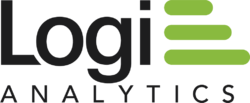Logi Analytics
 | |
| Privately owned, Venture Capital funded | |
| Industry |
Business Intelligence, Business Analytics, Data discovery, Embedded analytics |
| Founded | 2000 |
| Headquarters | McLean, VA, USA |
Key people |
Steven Schneider (CEO) Arman Eshraghi (Founder) Brett Jackson (Executive Chairman) |
| Website |
logianalytics |
Logi Analytics, Inc. is a computer software company headquartered in McLean, Virginia, United States with offices in the UK and Sweden. It offers interactive data visualization products for business intelligence and business analytics.
History
Logi Analytics, formerly LogiXML, was founded in 2000 by Arman Eshraghi, a software development and architecture professional. The company claims its mission is "to provide the benefits of traditional business intelligence to small- and mid-sized organizations".
In 2000, Logi Analytics developed LGX AppDev, an XML-based engine that built Web applications and evolved to address the specific task of report-building for BI. AppDev was used as the basis for the company's first product introduction in 2002. Logi Report (then called LGX Report), the first engine-driven, XML-based reporting application. Between 2002 and 2004, more features were added to Logi Report until Eshraghi made the decision to brand the full-featured version separately - as Logi Info - and offer the basic version free of charge.
Then in 2004, Logi Analytics began marketing Logi Report as a free Web-based BI reporting tool. The product was renamed Logi Report or Freereporting.com.[1]
In 2006, Logi Analytics discontinued the LGX branding and introduced the Logi product line, consisting of applications for ad hoc, managed and OLAP reporting, an embedded database to be used between operational databases and reporting servers, and a connector pack for integration of commonly used Web-based sources into the Logi reporting environment. They also started to expand internationally, partnering firstly with Nano Blue in AsiaPac, then Intenda in EMEA.
In 2008, Logi Analytics streamlined its commercial product offering, concentrating on Logi Info (managed reporting, analysis and dashboarding), Logi Ad Hoc (ad hoc reporting, analysis and dashboarding), and the Logi 9 platform (Web-based BI platform including managed and ad hoc reporting, analysis, dashboarding and data integration).
The company changed its name to 'Logi Analytics in March, 2013.[2]
In October 2013, Logi Analytics received a $27.5 million growth equity investment led by new investor LLR Partners. Updata Partners also participated in the round. The company previously raised $23.1 million from Updata Partners, Grotech Ventures and Summit Partners, who remain invested in the company.
In 2014, Logi Analytics introduced its data discovery product, Logi Vision, to be deployed as a stand-alone application or integrated with its business information platform, Logi Info. Together, these integrated products can be used by customers to address a wide range of analytics use cases across the organisation.
In July 2015, Logi DataHub was introduced as part of the Logi 12 release, designed to simplify data preparation and ensure high performance for self-service analytics. With DataHub, customers can rapidly connect, acquire, and blend data from files, applications or databases, whether on-premise or in the cloud; cache it in a high-performance self-tuning repository; and prepare it using DataHub’s smart profiling, joining, and intuitive data enrichment.
Products
Logi Analytics currently offers the following analytics products:
- Logi Info - Logi Info is a business analytics platform that enables technology professionals to rapidly create analytic applications. These applications offer self-service analytical capabilities[3] that can be accessed from anywhere and on any device. Logi Info can also embed analytics directly into a company’s operational business applications. Current version: Logi Info 12.2
- Logi Vision – A data discovery application designed for business users to "shape, analyze, and visualize data without IT assistance.”[4] Decision-making is accomplished through a recommendations approach that delivers best practices in data profiling and data visualization to make analysis easier for non-technical users.[5] Collaboration is accomplished using social techniques such as tagging, following, notifying, pinning, and ranking for workgroups to share and discuss insights. Current version: Logi Vision 2.1
- Logi DataHub - A light-weight data virtualization product that connects, acquires, and blends data. It caches the data in a self-tuning repository and prepares it using smart profiling, joining, and data enrichment. Logi DataHub can connect to on-premises or cloud databases or applications.[6] Current version: Logi DataHub 2.0
- Logi Ad Hoc - A self-service Web application that enables business users to create, manage, and share dashboards, reports, and analyses. Current version: 12.1
Market
Logi Analytics serves two primary markets:
- Small- to medium-sized businesses and departments/business units of large enterprises.
- Original Equipment Manufacturers (OEMs): independent software vendors (ISVs) and software as a service (SaaS) application providers that want to embed dashboard and reporting capabilities into their products.
References
- ↑ DM Review, July 2004.
- ↑ Kern, Justin (19 Mar 2013), Logi Analytics: Former LogiXML is the New Old Kid on the BI Block, Information Management
- ↑ http://www.dbta.com/Editorial/News-Flashes/Logi-Analytics-Breaks-Down-Barriers-to-Self-Service-BI-105441.aspxhttp
- ↑ http://www.b-eye-network.com/blogs/eckerson/archives/2014/08/logi_analytics.php
- ↑ http://www.zdnet.com/article/logi-vision-delivers-democratized-data-discovery/
- ↑ http://butleranalytics.com/logi-analytics-review/